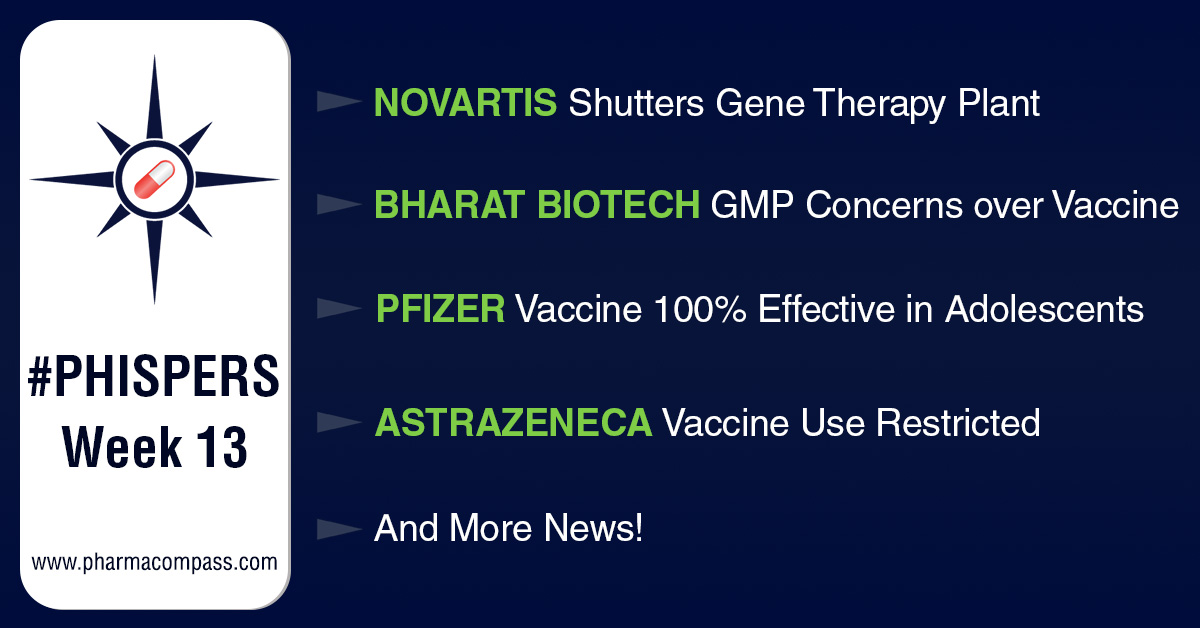
By PharmaCompass
2021-04-01
Impressions: 2412
This week, Phispers brings you more news on Covid vaccines. In the US, while Pfizer and BioNTech said their vaccine was 100 percent effective in preventing Covid-19 in 12 to 15 year olds, public health agency CDC came out with a report on messenger RNA vaccines. It said Moderna and Pfizer-BioNTech’s vaccines have shown to be effective in preventing symptomatic Covid-19 in randomized placebo-controlled Phase 3 trials. BioNTech has projected sales of nearly US$ 11.7 billion for its Covid-19 jab and plans to boost manufacturing capacity of the vaccine to 2.5 billion doses by the end of 2021. In other vaccine news, Germany has suspended the use of AstraZeneca’s Covid vaccine in people under 60. And Brazil’s health regulator Anvisa denied a certificate of good manufacturing practices to India’s Bharat Biotech for its jab — Covaxin.
In non-Covid news, Bristol-Myers and bluebird bio’s CAR T-cell therapy for multiple myeloma — ide-cel — finally bagged FDA approval in the US. And Novartis admitted it had overestimated demand for the world’s costliest drug — Zolgensma — when it opened a plant in Colorado (US) in January last year. Now, the Swiss drugmaker has said it is closing the plant by July 9.
Brazil’s health regulator rejects Bharat Biotech’s Covid vaccine due to GMP concerns
Brazil’s health regulator Anvisa has rejected Bharat Biotech International’s application for supplying Covaxin after an inspection of the company’s facility at Hyderabad (India) in March found violations of norms for good manufacturing practices.
Anvisa said Covaxin did not meet its manufacturing standards and has been denied a certificate for good manufacturing practices. Last month, the Brazilian government had signed a contract to buy 20 million doses of Covaxin. Bharat Biotech had applied for emergency use of the vaccine in Brazil on March 8.
The reasons for the refusal were non-compliance with several articles of rules and instructions on good production practices, which included problems with documentation, methods of analysis, the integrity of the containers and the methods used for “sterilization, disinfection, viral removal or inactivation,” and more. The laboratory inspection took place between March 1 and 5.
Bharat Biotech and its Brazilian partner Precisa Medicamentos said in a statement that they will appeal the decision and present evidence that Bharat Biotech is complying with all requirements. Covaxin has been approved for use in five countries, including India, the statement said.
Bharat Biotech told NDTV: “The requirements pointed out during inspection will be fulfilled, the timelines for fulfillment is under discussion with the Brazil NRA and will be resolved soon.”
Novartis shuts down its gene therapy plant in Colorado within 14 months
Back in 2019, AveXis, a subsidiary of Novartis, announced that it had acquired a manufacturing facility in Longmont, Colorado, for US$ 30 million from AstraZeneca to provide additional production capacity for Zolgensma, a gene therapy treatment for spinal muscular atrophy. The Novartis biotech firm had officially opened the Colorado plant in January 2020.
Within 14 months of opening the plant, the Swiss pharma giant has said it will be shuttered and 400 people will lose their jobs. The 692,000-square-foot complex will be closed by July 9. The facility had been acquired to bolster two existing production sites for the gene therapy, one in North Carolina and one in Illinois.
News reports indicate that Novartis might have overestimated the demand for Zolgensma. With a US$ 2.1 million price tag for its single IV dose, Zolgensma is the most expensive drug in the world. The drug generated US$ 920 million in sales last year.
In fact, Novartis said there was no necessity for the third manufacturing facility and that it will be able to meet manufacturing demands for the gene therapy from its other two locations.
“We will now focus on meeting the needs of patients through our Libertyville, Illinois and Durham, North Carolina sites, where we will continue to invest in next-generation processes,” the company said in a statement.
Pfizer-BioNTech jab 100 percent effective in preventing Covid-19 in 12 to 15 year olds
Pfizer Inc said the messenger RNA vaccine it has developed along with its German partner BioNTech is 100 percent effective in preventing Covid-19 in children between the ages of 12 and 15 years.
Pfizer’s CEO Albert Bourla said the American drug behemoth plans to submit the new vaccine data to the US Food and Drug Administration (FDA) “as soon as possible.” Due to these findings, children in this age group could become eligible for the vaccine before the start of the new academic year, in the US.
“We share the urgency to expand the authorization of our vaccine to use in younger populations and are encouraged by the clinical trial data from adolescents between the ages of 12 and 15,” Bourla said in a press release. In October 2020, Pfizer began testing its vaccine in children as young as 12 years. The trial enrolled 2,260 participants in the US. There were 18 confirmed Covid-19 infections observed in the placebo group and no confirmed infections in the group that received the vaccine, the company said. Therefore, the vaccine had an efficacy rate of 100 percent, and the shot was well-tolerated. The side effects were consistent with those seen in adults.
The company also said the vaccine elicited a “robust” antibody response in children, exceeding those in an earlier trial of 16 to 25 year olds. The Pfizer-BioNTech vaccine has already been authorized for use in the US in people aged 16 years and older.
According to experts, vaccinating children is crucial to ending the pandemic. According to reports, Johnson & Johnson plans to test its single-shot vaccine in infants and even in newborns, after testing it in older children first.
Encouraged by results from the 12 to 15 age group trial, Pfizer has begun testing its Covid-19 vaccine in children under 12. Last week, the company started a clinical trial on healthy 6-month to 11-year-old children. Results from the trial are expected in the second half of 2021, and the company hopes to vaccinate younger children in early 2022.
Moderna is also beginning a trial of its vaccine in children between six months to 12 years of age. Both companies have been testing their vaccines in children 12 years and older. Last month, AstraZeneca also began testing its vaccine in children six months and older.
In the US, an estimated 80 percent of the population may need to be vaccinated in order to reach herd immunity. And children under the age of 18 account for 23 percent of the American population.
CDC report on mRNA vaccines: In the US, the Centers for Disease Control and Prevention (CDC) came out with a report on the effectiveness of the two messenger RNA vaccines brought out by Pfizer-BioNTech and Moderna. According to the CDC, both the vaccines have shown to be effective in preventing symptomatic Covid-19 in randomized placebo-controlled Phase 3 trials.
According to a Tweet by the CDC, the study finds the vaccines to be highly effective in preventing Covid-19 among healthcare and other essential workers. The mRNA vaccines reduced the risk of infection by 80 percent after the first dose and 90 percent following the second dose.
However, the benefits of these vaccines for preventing asymptomatic and symptomatic SARS-CoV-2 (the virus that causes Covid-19) infection, particularly when administered in real-world conditions, is less well understood, the report said.
Bristol Myers, bluebird bio finally bag FDA nod for multiple myeloma therapy ide-cel
The year 2019 had begun with the US$ 74 billion mega merger of Bristol-Myers Squibb with Celgene. In 2018, bluebird bio and Celgene had entered into an agreement to co-develop and co-promote bb2121 (ide-cel), an investigational anti-B-cell maturation antigen (BCMA) chimeric antigen receptor (CAR) T cell therapy, for the potential treatment of patients with relapsed/refractory multiple myeloma in the United States.
Celgene and bluebird bio had entered into a broad, global strategic research collaboration in 2013. With the mega merger, bluebird bio began developing ide-cel along with Bristol-Myers.
In March 2020, Bristol-Myers and bluebird had submitted the Biologics License Application (BLA) for ide-cel with the US Food and Drug Administration (FDA). But in May 2020, the companies received a refusal to file letter from the FDA regarding the BLA for ide-cel. The two companies then resubmitted the BLA in July 2020.
Post the acquisition by Bristol-Myers, the Celgene shareholders held US$ 9 per share Contingent Value Rights (CVR), which hinged on US regulatory approval of three drugs: Zeposia, ide-cel and liso-cel. Celgene’s multiple sclerosis drug Zeposia (ozanimod) was approved in March. However, the FDA did not approve liso-cel (another CAR-T therapy) by the December 31, 2020 deadline and as a result, the CVR agreement got terminated. The liso-cel therapy bagged FDA approval in February this year. And now, the FDA has approved Abecma (ide-cel) for adult patients with multiple myeloma after four or more prior lines of therapy.
Bluebird bio confirmed it has set the wholesale list price of ide-cel at US$ 419,500. Brokerage firm Piper Sandler expects the treatment to bring in sales of over US$ 2.5 billion by 2030.
BioNTech expects US$ 11.7 billion in 2021 sales, to boost capacity to meet demand for Covid shots
German biotechnology firm BioNTech has projected sales of nearly US$ 11.7 billion for its mRNA Covid-19 vaccine — Comirnaty — developed along with Pfizer Inc. The two companies will boost manufacturing capacity of their Covid-19 vaccine to 2.5 billion doses by the end of 2021, BioNTech has said.
Its partner, Pfizer, has projected about US$ 15 billion in Covid-19 vaccine sales for this year, while Moderna is getting ready to post vaccine sales of about US$ 18 billion in 2021.
Earlier, Pfizer had said that the partners would produce between 2.3 billion and 2.4 billion doses in 2021. BioNTech has cited its new facility in Marburg (Germany) and an expansion of Pfizer-BioNtech’s network of third-party manufacturers and suppliers as drivers of the higher volumes.
According to BioNtech’s CEO and co-founder Ugur Sahin, efforts to ramp up production at its Marburg facility, where it launched production in February after purchasing the site from Novartis last year, were making “remarkable progress”.
As of last week, more than 200 million doses of Comirnaty had been supplied to more than 65 countries. Signed orders for delivery in 2021 currently amount to 1.4 billion doses, said BioNTech.
Germany, Canada restrict use of AstraZeneca’s Covid shot in people under 60
AstraZeneca’s Covid-19 vaccine continues to be shrouded in controversies. Germany’s medical regulator said it has received reports of 21 cases of rare blood clots in people who had recently received Astra’s jab. The Paul Ehrlich Institute said seven people affected by the blood clots have died. As a result, German health officials have agreed to restrict the use of the Astra jab in people under the age of 60 years. Similarly, Canada has suspended the use of the vaccine in people under 55 years of age.
Germany will deploy AstraZeneca’s coronavirus vaccine for general use only for those over 60 years, the government said. Germany is also reassessing Astra’s jab. Dilek Kalayci, Berlin’s top health official, said that Germany’s independent STIKO vaccine commission and the Federal Institute for Vaccines will make new recommendations on how to proceed.
Recently, regulators in more than 20 European countries had suspended distribution of the AstraZeneca vaccine. There were reports of “blood clots” in recipients of this vaccine. Since then, the World Health Organization and the European Medicines Agency have said that the benefits of the vaccine far outweigh the risks. However, critics of the vaccine have not said the potential risks should be ignored.
People are fast losing confidence in the Astra vaccine — close to 60 percent of French adults now say they have little or no confidence in the AstraZeneca vaccine; similar poll numbers are turning up in Germany, Italy, and Spain.
The original vaccination pause may be over in many countries, but investigations are continuing, and regulators around the world are taking further action. In France, for example, the National Agency for the Safety of Medicines and Health Products has identified nine cases of these blood disorders (including two deaths) out of 1.4 million injections, and described it as a vaccine reaction. Denmark’s health authority has extended its blanket suspension of the AstraZeneca vaccine for three more weeks. And Norway has done the same.
The PharmaCompass Newsletter – Sign Up, Stay Ahead
Feedback, help us to improve. Click here
Image Credit : Phisper Infographic by SCORR MARKETING & PharmaCompass is licensed under CC BY 2.0
“ The article is based on the information available in public and which the author believes to be true. The author is not disseminating any information, which the author believes or knows, is confidential or in conflict with the privacy of any person. The views expressed or information supplied through this article is mere opinion and observation of the author. The author does not intend to defame, insult or, cause loss or damage to anyone, in any manner, through this article.”








